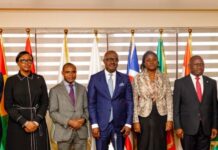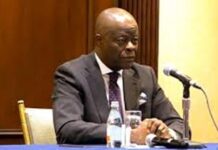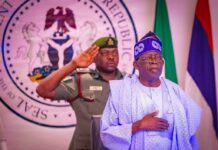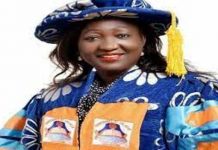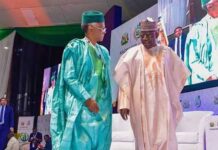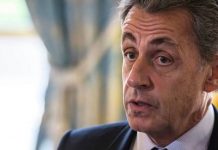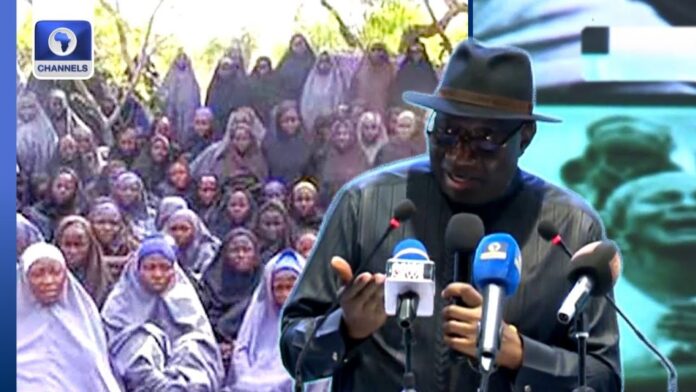Former President Goodluck Jonathan has declared that one of the major scars on his government, which will remain on my face, is the abduction of teen girls from Government Girls Secondary School, Chibok in Borno State.
Recall that on the night of April 14–15 April 2014, 276 schoolgirls aged from 16 to 18 were kidnapped by the Islamist militant group Boko Haram from the GGSS.
After the incident, 57 school girls immediately escaped by jumping from the trucks on which they were being transported, while others were rescued by the Nigerian Armed Forces on various occasions. As of 14 April 14, 2025, eleven years after the kidnapping, 82 of the girls were still missing, assumed to be in captivity
Speaking yesterday in Abuja during the public presentation of “Scars” ‘Nigeria’s Journey and The Boko Haram Conundrum’ written the former Chief of Defence Staff, General Lucky Irabor, the former president said the “no plastic or cosmetic surgeon can remove it from his government.
“One of the major scars on my government, which will remain on my face…and no plastic or cosmetic surgeon can remove it, is the issue of the Chibok girls. It is a scar I will die with. But perhaps later, more details may become known, and that too has to do with Boko Haram. What did they really want? he said.
Thereafter the former president spoke specifically about the Boko Haram insurgency and the efforts made by his administration to stop it.
He stated that in tackling the insurgency which predated him in 2009, his administration established several committees to explore options for peace with Boko Haram.
During one of such processes, he said the insurgents named late President Muhammadu Buhari as their preferred negotiator.
He said he believed when they nominated Buhari and he (Buhari) eventually became president from 2015-2023, it would have been easier to negotiate with the terrorists to surrender, but the insurgency persisted.
“If you conduct research and interview many people, you will only get part of the story, but never the full story of Boko Haram. I was there. Boko Haram started in 2009 when I was vice president. I took over in 2010 and spent five years battling the insurgency until I left office. At one of the committees we set up then, the Boko Haram nominated Buhari to lead their team to negotiate with the government
“So, I was feeling that, if they nominated Buhari to represent them and have a discussion with the government committee, then when Buhari took over, it could have been an easy way to negotiate with them and they would have handed over their guns. I thought that after I left, within a reasonable time, General Buhari would wipe them out. But even today, Boko Haram is still there. The issue of Boko Haram is far more complex than it is often presented.
“So, it’s a bit complex, and not a matter of a single story. But I believe, as a nation, we have to look at the Boko Haram issue differently from the conventional approach. I believe one day we’ll overcome it. “One of the major scars on my government, which will remain on my face, as Bishop Kukah said, and no plastic or cosmetic surgeon can remove it, is the issue of the Chibok girls. It is a scar I will die with. But perhaps later, more details may become known, and that too has to do with Boko Haram. What did they really want? Our chairman of this occasion, (Former President Obasanjo) once raised the issue when he interviewed some of them, and they gave him certain perspectives.
“But I pray that one day, some of the Boko Haram leaders may be literate enough to document what they have done, so that people will truly understand what they wanted. It is similar to the story of the Nigerian Civil War,” he said.
Jonathan further stated that the real issue of Boko Haram was beyond hunger.
“If it was only about hunger, we tried different options. But I don’t want to sound like I’m defending my government. That will be left for history when we document our books. But I believe we did our best: we set up different committees and tried various approaches during the five years I was in office. I believe the late Buhari too must have tried his best. I also believe that all the military officers involved in the Boko Haram saga should provide information about what the group truly stood for.
“I believe the government—luckily, with the Defence Minister here and the service chiefs represented—must adopt a slightly different approach. God willing, we will be able to resolve this crisis,” he added.
He advised President Bola Tinubu to consider the carrot and stick approach to address insurgency in the country.
“The issue of carrots and the stick may be adopted. Probably the needs are there, but if you look at the weapons they use, and you value the weapons, then you know that these people are not hungry people. So, the soldiers that sometimes capture some of the weapons will see better, but the weapons they use, the ammunition they use, sometimes they even have more ammunition than our soldiers. Where are these guns and sophisticated weapons coming from? And you begin to see that the external hands are also involved, especially when I was president.”
Among dignitaries at the occasion were the Sultan of Sokoto, Sa’ad Abubakar lll; Bishop Matthew Hasan Kukah, Catholic Bishop of Sokoto Disease, Matthew Kukah who was the book reviewer; Chief of Defence Staff, General Christopher Gwabin Musa; former national security adviser, Major General Babagana Monguno; former Chief of Defence Staff, General Alexander Ogomudia (retd); Vice Admiral Dele Ezeoba (retd) and the minister of budget and national planning, Mr Atiku Bagudu.

